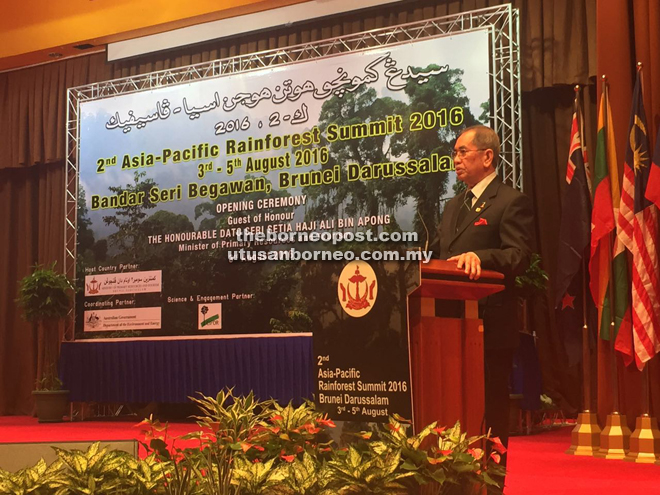
Wan Junaidi speaking at the 2nd Asia-Pacific Rainforest Summit 2016 in Brunei Darussalam yesterday.
BANDAR SERI BEGAWAN: Malaysia is committed in preserving its natural resources and in implementing sustainable forest management (SFM), but it hopes there would be aid for tropical countries and a green premium for timber products from SFM.
Minister of Natural Resources and Environment Dato Sri Wan Junaidi Tuanku Jaafar said because implementing SFM was costly, there was an urgent need to mobilise additional financial resources to enhance capacity development and transfer of environmentally sound technologies to tropical countries.
“Malaysia hopes there will be assistance to tropical countries as stated in Item 15.5 of the Sustainable Development Goal of the 2030 Agenda for Sustainable Development,” he said at the 2nd Asia-Pacific Rainforest Summit 2016, which is being held at Brunei Darussalam from Aug 3-5.
Item 15.5 of the Agenda touches on mobilising significant resources from all sources and at all levels to finance sustainable forest management and to provide adequate incentives to developing countries to advance such management, including for conservation and reforestation.
Wan Junaidi also raised another important issue — the need for a green premium on timber products from SFM.
“The provision of green premium and harmonisation of consumer procurement policy by importing countries can be one of the incentives to promote and encourage SFM,” he said.
“Without the support of the international forest community and positive market response, the efforts of developing countries will be limited.”
On Malaysia, he said Malaysia gave equal emphasis to promoting the conservation of its natural resources and also the social and environmental aspects.
These were all enshrined in the National Forest Policy 1978 (Revised 1992) and the National Policy on Biological Diversity (2016-2025).
“Malaysia recognises that forests play an important role in the maintenance of climatic and environmental stability, conservation of the invaluable biodiversity, and in the supply of clean water resources,” he said.
“Malaysia remains committed to implementing SFM in line with decisions reached during the United Nations Conference on Environment and Development (UNCED) 1992, Rio+20 Conference in 2012, and in the recent United Nations Sustainable Development Summit.”
He added that Malaysia had held firmly to its commitment to maintain at least 50 per cent of the country’s land area under forest and tree cover.
“Opportunities for non-governmental organisations (NGOs) and communities to be involved in the implementation of SFM have been implemented in some of the restoration programmes such as mangrove rehabilitation and restoration of degraded forest areas.”
Among some of the main efforts that have been carried out are preservation and conservation of forests through forest rehabilitation programmes like tree planting in abandoned and degraded land areas; advocating sustainable forest landscape management such as The Heart of Borneo (HoB) in Sabah and Sarawak and the Central Forest Spine (CFS) in Peninsular Malaysia.
Among those present were Brunei’s Minister of Primary Resources and Tourism Dato Seri Setia Ali Apong, Australia’s Minister of Environment Josh Frydenberg,Fiji’s Minister of Fisheries and Forests Osea Naiqamu, Mynamar’s Minister of Environment Conservation and Forestry Ohn Win, Timor Lester’s Minister of Commerce, Industry and Environment Constancio da Conceicao Pinto, Vanuatu’s Minister of Climate Change Ham Lini Vanuaroroa, Vanuatu’s Minister of Agriculture, Livestock, Forestry, Fisheries and Biosecurity Matai Seremaiah,Laos’ Vice Minister of Natural Resources and Environment Bounkham Vorachit, Cambodia’s Secretary of State for Environment Yin Kimsean and Solomon Islands’ Minister of Forestry and Research Vaeno Wayne Vigulu.
